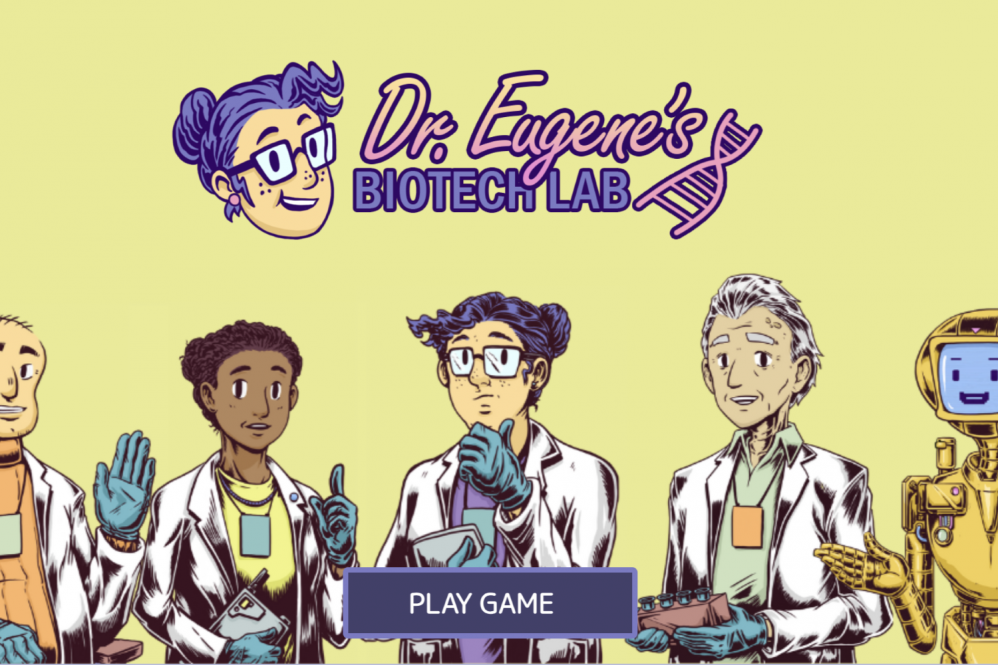It is your first day as a new intern in Dr. Eugene’s Biotech Lab, a new online game from UConn Extension. Xeb, a robot, greets you and introduces you to the lab and its four areas of gene editing research: food production, health, nutrition, and the environment. You can explore each of these areas, and work with different scientists to address issues facing this fantasy world. Each of the issues has a parallel example from Earth.
UConn Extension, located within UConn’s College of Agriculture, Health and Natural Resources (CAHNR), developed the game in partnership with the Learning Games Laboratory at New Mexico State University (NMSU). Jen Cushman, an associate extension educator and the UConn 4-H state program leader is principal investigator on the project funded by USDA-NIFA.
“This grant provides life transformative experiences to youth through 4-H experiential learning in food and agricultural sciences leading to STEM career development in biotechnology,” says Cushman. “Through engagement in this UConn 4-H program and participation in the game, we hope youth will build awareness of STEM biotechnology careers and consider pursuing a biotechnology career in the future.”
The Bureau of Labor reported 2.1 million life sciences jobs in 2023 with a 4.1% growth rate, and this includes biotechnology, food, and agriculture. It is a growing career field with identified needs for more qualified employees.
UConn 4-H, a program administered by UConn Extension, works statewide with youth across multiple program areas to develop the 4-H fundamentals of spark, belonging, relationships, and engagement.
UConn 4-H provides workforce development through all its programs, with core areas of leadership, healthy living, civic engagement, life skills, and STEM. Over 21,000 youth participate in statewide UConn 4-H programs annually.
The Advancing 4-H Youth Careers in Food and Agriculture via Biotechnology and STEM (Science, Technology, Engineering and Math) has a multi-faceted approach to positive youth development.
First, youth belong to a cohort led by a UConn Extension instructor who guides them through biotechnology and educational curriculum, creates the sense of belonging, and leads regular club meetings.
Next, the youth participate in field trips to CAHNR and other locations. Finally, the youth were also involved in game development, pitching their ideas to the UConn and NMSU teams, and providing feedback during game development.
“The beginning stage of game development was quite exciting, just a bunch of ideas coming together,” says Kouthar Wehelie of Suffield, a UConn 4-H member involved in the process. “Just the thought of being able to teach youth all that really inspired me to try to find something that will keep kids interested. Learning all about biotech and those things was a really exciting process.”
Youth also created the game title through an interactive brainstorming and voting session.
Dr. Eugene’s Biotech Lab is the first of two games that the teams are producing, the second being released in 2025. The program is currently recruiting youth to participate in the second cohort. The Learning Games Lab at NMSU Extension is an award-winning program that develops educational media for youth and adult audiences.
This is the first time that NMSU included youth in the game design process.
“I would describe it as an educational game, definitely near the upper echelon of them. Go learn about genetic modification to see if you find it interesting, the game is a good jump off point for 6th or 7th grade kids,” says John-Anthony Samuel of Bloomfield, a UConn 4-H member who was part of the development and feedback process.
As the player continues through the game, they earn achievements in the different laboratories. The game guides them through the entire scientific process, from the gene editing mini game to reviewing experiment results and applying for a patent or writing a peer-reviewed publication.
Laboratory experiments include biotechnology successes and failures, offering a realistic overview of working in a science laboratory.
“I’ve always been interested in the sciences,” Samuel says. “Dr. Eugene’s Biotech Lab is a good way to introduce kids who were pushed away from science by school, or their household doesn’t have a background in it, and have them engage with the topic. There is more to chew on and think about.”
This work relates to CAHNR’s Strategic Vision area focused on Ensuring a Vibrant and Sustainable Agricultural Industry and Food Supply.
This work is supported by the Food and Agriculture Nonformal Education program, grant no. 2022-68018-36094 from the USDA National Institute of Food and Agriculture.



